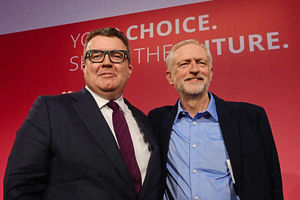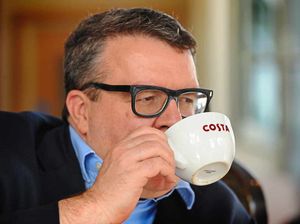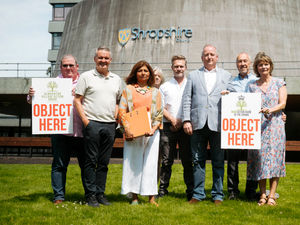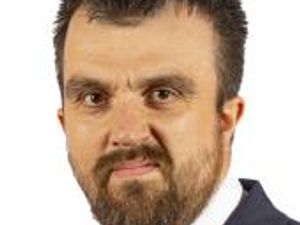Labour's Tom Watson MP talks Glastonbury, cheese toasties and his first year on the job
Life is a balancing act for Labour's deputy leader Tom Watson. He talks Glasto, cheese toasties and his first year in the job.

I've had very little time to see bands since I've been deputy leader."
Tom Watson is in a reflective mood as we sit supping lattes in the busy Costa Coffee shop in West Bromwich's New Square.
The West Bromwich East MP's love of indie rock has been well documented, but aside from a Billy Bragg gig in London a few months back, his hobby has had to take a back seat.
By his own admittance it has been a roller coaster ride since the day he was voted in as deputy leader a little over seven months ago.
Name: Tom Watson
Age: 49
From: Kidderminster
Famous for: Deputy leader of the Labour Party
Random fact: Hist first 'work' for the Labour Party came as a seven-year-old in the February 1974 general election when he collected polling cards at Kidderminster's Franche School
We are in the middle of the Parliamentary Easter recess and he's back on home turf spending time with the family – something he's been keen to maintain despite his packed schedule.
It is not easy. The previous night Tom struggled to finish work on a key speech on the EU referendum he was due to deliver in a few days time because he was 'busy playing Scalextric with the kids'.
His children, aged seven and 10, occasionally join him on the road and attend his speeches – his daughter even fell asleep during one of them.
They're here with him now on the next table across, eating cheese toasties while they wait for dad to finish talking shop before they head to the Merry Hill Centre for pizza and the new Eddie the Eagle film.
"It is half term and I've been trying to look after them," he says, a broad grin spread across his face.

His working week starts at 6.30am when a review of the morning's news pings through to his phone and from then on it's all systems go.
Although Tom has held high level posts before, this is an altogether different challenge.
"It's certainly the most pressured position I've held," he says.
"There's a lot of demands on time and it feels like you're constantly spinning plates trying not to let anyone down.
"If you have a bad day the plates come crashing down," he adds with a laugh.
"I definitely think that going through so many difficult periods in politics in the past has made handling this job a lot less difficult. You have to go into it with optimism in your heart and a sense of humour. You have to do good where you can as no day is the same."
Shadow cabinet chaos
Tom Watson says that most people find the arguments around Britain's membership of the EU 'completely bewildering' as he bids to 'widen the debate' ahead of the June referendum.
Labour's deputy leader has vowed to ensure that the debate over the EU is not confined to issues surrounding immigration, describing robots as a far bigger threat to British jobs than foreign workers.
The West Bromwich East MP, who made his first major speech on the EU referendum earlier this month, says: "There is no doubt about it, that if Nigel Farage and some of the Brexit people have their way they will try and make this referendum, not on whether people's best interests are served by the EU, but solely on immigration.
"Free movement of labour and immigration are part of the debate about our European future, but if you look at where people's jobs are under threat, it is through people not paying their taxes, holding their money in offshore accounts so they are not paying into the UK economy, and global corporations like Google paying three per cent tax on all the money they make here.
"There are 11 million jobs under threat by automation in the next decade. There are bigger threats to people's livelihoods than immigration. I really hope we can have a wider debate.
"The biggest threat is not Romanian workers, it is automated systems and robots."
Tom adds: "Last quarter Google made US$90m from online advertising.
"Now they were taken to task by the European Commission for abusing their market dominance in the online advertising market and they had to change what they did.
"The idea that in the UK alone one firm is pulling in such vast sums of money is fanciful. We need to be part of the union to challenge the self-interest of global corporations. I hope we can get that in the debate. I hope that on the Friday after the local elections we have a proper six week debate on the EU.
"I get the impression that at the moment a lot of people feel completely bewildered by it all. There are so many people coming forward with strong opinions that it leaves a lot of people not really in a position yet to make an informed decision.
"People deserve more than simple sound bytes."
Meanwhile Tom says the Labour Party has 'learned some harsh lessons' from the Scottish independence referendum, where the party's decision to stand alongside the Tories led to a backlash from some supporters north of the border.
This time around the party is determined to run its own distinct campaign, he says.
"We got tarred with the same brush as the Tories and were punished by voters in Scotland.
"So Jeremy has said he won't share a platform with David Cameron and I think he's quite right. It also gives us the space to talk about the kind of Europe that we want to see.
"I want to talk about why it is in the interests of Britain's workers to remain in the EU, which is the type of thing David Cameron won't be talking about."
He adds that the Labour leader would be taking a more central role in the debate as the referendum date draws near.
"In the early days Jeremy was respecting Alan Johnson's (leader of the Labour In group) position by not taking a front role, but we're both going to speak on the issue," he says.
"We're both committed to remain."
January saw arguably his first major challenge with Jeremy Corbyn's protracted shadow cabinet reshuffle sending the party into chaos.
In the days that followed three shadow ministers resigned, while discontent over the handling of the reshuffle – which saw casualties including Pat McFadden getting sacked by text message as the clock ticked towards midnight – rumbled on for weeks.
Tom admits that 'things should have been handled better'.
"It was a turbulent period, but leaders have to decide the team they want," he explains.
"It's the hardest human resources job in the land. You've got to move a lot of powerful people with strong personalities into roles they don't necessarily want to do.
"I was disappointed to see Pat go. He was a very hard worker and a very efficient front bench shadow minister.
"The problem with reshuffles is that you very often end with things happening late. But it should have been better. I always think if someone is going to be sacked then you should tell them face to face if you can."
Tom describes his key job as unifying the party, 'holding things together and making it work in difficult times'.
And he has had his work cut out almost from day one, with rumours of a leadership challenge already gathering pace.
Last month's embarrassing leaked list ranking Labour MPs in terms of their loyalty to the leader was an 'unwanted distraction', according to Tom.
"Every day that newspapers are reporting internal rows in the Labour party is a day that we can't get our positive message out there," he says.
But he is convinced there will be no attempt to oust Mr Corbyn.
"In fact I'm asking people not to contemplate it or discuss it," he adds.
"These things have a habit of taking on a life of their own if you let them and it just seems to me that when a quarter of a million people less than one year ago took part in a huge one member one vote selection, for a leadership challenge to happen within nine months is not something our members would appreciate.
"No one has openly said they plan to stand against Jeremy for leader. If they do I think they will find it very difficult to get support.
"It's not really for other MPs to judge whether Jeremy has succeeded or failed as a leader, particularly after only seven months. It's down to our members. They are the ones who decide who our leaders are.
"What I expect our MPs and activists to do is to focus on our positive message for change in the build up to the council elections and campaigning for the European referendum."
Working with Jeremy
Tom says he believes calm has fallen over the party now, with more of 'a sense of fairness' among MPs. He describes his own relationship with the party leader as 'very strong', despite the fact that they don't always agree on policy, the Trident nuclear missile system being one example.
"I actually get on with him very well," Tom says of Labour's leader. "We enjoy each others company. He's very well read and an interesting person.
"We kind of knew we would be in it together on day three when there was a story suggesting we'd stolen food from the mouths of Britain's war veterans.
"I realised that we had entered a maelstrom. We've got different views on a number of issues, but it's about how you manage the difference and if you can get through that together as a team."

There is little doubt that Labour's struggles have paled into insignificance to the trials and tribulations of the Tories over the last few months.
George Osborne's embarrassing U-turn over disability benefits cuts, the subsequent resignation of Iain Duncan Smith – which Tom describes as 'quite remarkable' – and the Prime Minister becoming embroiled in the Panama papers controversy. All manna from heaven as far as the Labour Party is concerned.
Conservative crisis
Tom is unequivocal in his verdict on the current state of the government, and is particularly critical of its botched handling of the problems surrounding the steel industry.
"They are in crisis," he says.
"It feels like there's almost a rupture on where they stand on Europe and then the big one for our area is their failure to get a grip of the troubles surrounding the steel industry.
"The government has just been behind the curve.
"I think this has shown that the weakest link in the Conservative administration is actually Sajid Javid.
"As business secretary he doesn't believe in market intervention. He believes the market is a cure and the government gets in the way.
"With 11 million jobs going due to automation that's putting yourself in the hands of fate. It's not going to cut it.
"He should know how important this industry is to our infrastructure, but it is like he's sort of wedded to an ideology that says the government can't intervene.
"He was almost going to let the industry go under. Cameron intervened to take him off the day-to-day leadership of the crisis, but it is a pretty poor show. They should have spotted this coming."

Tom says the Panama papers scandal has put the Prime Minister under 'intense pressure', and led to him 'losing control of his MPs'.
"I still think a lot of voters have still got a lot of respect for David Cameron, and that's partly why Labour needs to up its game by holding him to account, but he's just lost the authority of his MPs.
"He's not been sharp enough in dealing with some of these really critical issues for the economy."
So how does Labour push home the advantage of the Tories' period of malaise? For the first few months of his tenure as leader Jeremy Corbyn came under criticism from some quarters for his apparent failure to hold the government to account, an accusation backed up by some fairly limp performances during Prime Minister's Questions.
"He's certainly got a very different style to me," Tom says of his leader.
"In the chamber I always try and be more forensic and calmer and more polite. I can't believe I'm saying that because I once very badly lost my temper with Michael Gove when he cut the schools budget in Sandwell. I called him a miserable pipsqueak of a man!
"I think it's better if you ask forensic questions, but where I defend Jeremy is that I think he is unfairly attacked on his work at PMQs because what he won't do is score cheap political points. He sticks to higher order issues, those he feels very strongly about.
"Grown-up politics, asking serious questions is where the public expect politicians to be. All that yahoo and name calling just diminishes the whole of the Parliamentary process. He's right not to play those games."
Winning back power
With the next general election still four years away, Tom admits that persuading the country to back the party into power will be 'no easy task'.
The wounds of last May's defeat are clearly still raw, particularly over Labour's failure to successfully put across some of its key policies.
Tom continues: "We've got to convince people that we are ready to run the economy in their interests and fairly. When you've lost two general elections in a row it is a long journey back.
"People were very angry in the run up to the last election over this idea that some people play by the rules and others don't, particularly when it comes to tax.
"I think Labour was right to call out some of those big corporations, companies like Google with their very complex ways of avoiding paying tax in the UK.
"But a lot of sole traders and small businesses thought we were talking about them as well. It's not what you say on the doorstep that matters it is what people hear and I talk to a lot of struggling engineering and manufacturing firms in this neck of the woods and they want to believe that Labour is on their side again.
"But I think we've got a lot of work to do. If we can't convince people that we are safe to run the economy again we won't win.
"We've got to put the government under pressure and make sure that they are held responsible for the decisions they make."
There's little chance of Tom slowing down for the foreseeable future. And his love of live music will continue to take a back seat as he plots Labour's run to 2020 and beyond.
"There is one thing I'm determined to do though," he says. "I read in the paper that Jeremy is going to the Glastonbury festival this year. I need to find a way of going there with him.
"The Selecter are playing. There's no way I want to miss that."
By Pete Madeley





